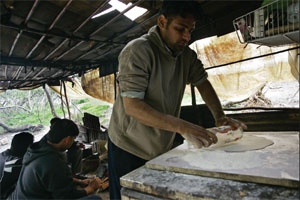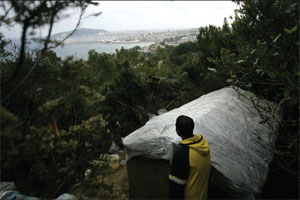
Sikh Boys Stranded in Ceuta
Blogged by: Amol Singh
 For many of us, the ability to live our lives in the diaspora is a direct consequence of journeys emanating from Punjab. Our fathers and mothers left economic insecurity and political uncertainty and set sail on ships and planes to far off backwaters in hopes of finding routes to the holy grails of North America and Europe. In today’s grapevine, it has become a casual affair to hear of Panamanian border crossings and Cuban raft rides. In a remarkable event, Spanish documentary film makers Alberto Garcia Ortiz and Agatha Maciaszek are currently in the process of filming the harrowing story of 54 Punjabi’s; who stranded in the Spanish city of Ceuta and fearing detention and deportation have fled and taken up refugee in the hills of the city.
For many of us, the ability to live our lives in the diaspora is a direct consequence of journeys emanating from Punjab. Our fathers and mothers left economic insecurity and political uncertainty and set sail on ships and planes to far off backwaters in hopes of finding routes to the holy grails of North America and Europe. In today’s grapevine, it has become a casual affair to hear of Panamanian border crossings and Cuban raft rides. In a remarkable event, Spanish documentary film makers Alberto Garcia Ortiz and Agatha Maciaszek are currently in the process of filming the harrowing story of 54 Punjabi’s; who stranded in the Spanish city of Ceuta and fearing detention and deportation have fled and taken up refugee in the hills of the city.
Most of these 54 young men left India over five years ago and since then have criss-crossed Africa – Burkina Faso, Mali, Mauritania, Algeria, and Morocco. Finally, after as many as 18 attempts, they have managed to enter Ceuta only to discover themselves in limbo: while technically in European territory, they are not on the European continent. In this garrison town between the border fence and the sea, one cannot work or get to the mainland; all one can do is wait. Migrants are stored in a detention center – sometimes for years – while the Spanish authorities attempt to negotiate their deportation back to their home countries.
The boys tales also include dubious agents and the near isolation from their distraught families back home.
Undaunted by the paucity of resources and impressed by the indomitable spirit of the young Indians, it seemed like a natural progression for the film makers to visit the boys’ families in Punjab. “We taped the messages of 13 boys and then got their families’ reactions,” says Ortiz who admits that meeting the families was emotionally harrowing…“One guy, Amardeep, was so depressed he didn’t sleep for weeks and had to be hospitalised in Ceuta. We filmed him in the psychiatric ward there. His parents know he’s prone to worrying about the family — they are in big economic trouble — but have no idea of his condition. We felt like we were playing with fire,” says Ortiz who explains that the as-yetunnamed documentary tells the larger story through individual ones.
As a part of the collective Langar Hall community that is so apt to squabble over what many times are inconsequential events, let’s attempt to find ways through which we can tangibly affect the lives of our brothers stuck in Ceuta. So in your comments below, offers suggestions on ways through which we as a global sikh sangat can attempt to intercede on behalf of these youths.
 I’ll begin by re-proposing the ways that one can contribute to the film team making the documentary. The ways can be diverse:
I’ll begin by re-proposing the ways that one can contribute to the film team making the documentary. The ways can be diverse:
- economic contribution to the account that let down
- sponsored enterprises, particularly in Ceuta, where it is developing the documentary
- free accommodation for a team of 4
- any other help
- dissemination of the project by any means
- collaboration with logistical support in Ceuta
- professional collaboration: sound engineers, production assistants and so on
To assist in the project, write to: agathiu[at]gmail.com














Your article is very nice its very useful for all the students. this guide is use for all the bio exams for students and also using this blog for research students also i am a one of the biology students thanks to giving us. can get the more information thank you again for your valuable information.